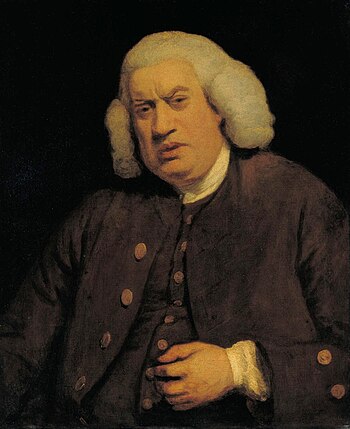 |
| Portrait of Samuel Johnson commissioned for Henry Thrale's Streatham Park gallery (Photo credit: Wikipedia) |
Timing, they say, is all.
An odd coincidence occurred today. I was due to write this post, as a follow-up
to last week’s effort. But, I’d also determined I would enter at least 4
writing contest during the month, and I’d only managed 2 entries by yesterday.
In preparing for the other two, I went online and discovered at the top of my
emails an alert to the Writers’ Village blog I follow for its excellent advice
and content. The subject matter was ‘A Simple Idea That Can Sell a MillionBooks’. Bearing in mind what I said last week about money as a motivator, I
thought I should at least read the piece. If you click on the title, it’ll take
you to it.
It was one of those posts,
of which there are many these days, promoting the idea that money can be made
from writing by doing a great deal of it and getting it published, more or less
regardless of the quality. It’s a persuasive argument for a lot of would-be
writers and there’s evidence that this approach does, indeed, earn its better
practitioners money. I had to make a comment, of course.
So; back to the theme of
this post. Priorities. Do you know what yours are? Are you driven by money?
James Boswell, in his Life of Samuel
Johnson, wrote, ‘No man but a blockhead ever wrote, except for money’.
However, Samuel Johnson himself wrote, ‘The only end of writing is to enable
the readers better to enjoy life, or better to endure it’.
My own primary aim is to
increase my number of readers. It’s been suggested that the easiest way to do
so is to charge nothing for the books. I do have a short story offered free; But, Baby, It’s Cold Outside is a bit of
seasonal cheer to make readers smile. But it’s been proved, many times, that in
general terms, people place little value on something that has no worth placed
on it by the producer. So, I compromise and price my books at what seems a fair
cost for the piece on offer. Before I place a piece to market, I spend as much
time as is needed to make it the very best I can. My priority has been quality
at the expense of quantity.
Perhaps I’ve been too
concerned with this aspect, since it’s clear that many readers are not really
concerned with the quality of the writing. I’m not sure, to be honest. But, in
the interests of discovering whether my writing can stand the rigours of quantity
and remain both accessible and readable, I’ve decided to devote this year to
more in the way of quantity.
So far, I have 7 books
available, published over a period of 5 years. This year I aim to produce a
further 4 titles. Nothing like the quantity that many of the
genre/formula-fitting writers produce, of course. But a challenge, if quality
is to be maintained.
So, my priority for this
year is to write, and publish, 4 new titles. This means that certain other
activities will necessarily have to be curtailed. Much less time with Twitter,
Facebook and the other social networks to which I contribute. But not a
complete cessation, of course. I will still need to let people know about my
writing, after all.
Last week, when I wrote
the first part of this post, I had little idea where I would end up. I’ve now
set my aims. Do you have targets, aims, priorities in your writing life? If so,
please share them with us here.
Oh, and I will try to
maintain a post each week here on the blog, of course.
















